Are You Suffering from Adrenal Exhaustion?
Can’t get moving in the morning without a hefty dose of caffeine? You could be suffering from adrenal exhaustion.
Get full access to Outside Learn, our online education hub featuring in-depth nutrition, fitness and adventure courses, and more than 2,000 instructional videos when you sign up for Outside+..

If you can’t get through the day without coffee, the problem might not be a lack of sleep, but adrenal exhaustion—a common consequence of our stress-filled 21st-century lives.
Adrenal issues can be divided into three types: adrenal stress, subclinical and secondary adrenal exhaustion, and primary adrenal exhaustion. They all center around cortisol, an often misunderstood hormone.
You have two adrenal glands, each located on top of your kidneys. They release a variety of hormones to maintain biological balance in response to stress. The more stress you experience, the harder your adrenals must work to protect you. When stress is chronic—such as work, traffic, and difficult relationships—the body ramps up production of cortisol, which helps buffer us against the stress.
We all need some cortisol to maintain normal health and to insulate ourselves against minor day-to-day stresses, as well as maintain normal blood pressure and blood sugar. When we’re chronically stressed—experiencing adrenal stress—cortisol levels remain high. These elevated cortisol levels depress the body’s production of the hormone dehydroepiandrosterone (DHEA), which is needed to make estrogen, progesterone, and testosterone. Too much cortisol also promotes the formation of fat around the belly, and it interferes with the body’s production of thyroid hormone. And over many years, abnormally elevated cortisol levels can increase the risk of heart disease.
Adrenal exhaustion develops when a person no longer can make sufficient amounts of cortisol, leading to fatigue. In other words, while chronically elevated levels of cortisol aren’t healthy, it’s low cortisol levels that characterize adrenal exhaustion. Many people counter the fatigue by consuming more caffeine (in coffee, soft drinks, or energy drinks) to sharpen up and boost their energy levels.
Symptoms of Adrenal Exhaustion?
If coffee consumption is any indication, millions of people may be suffering from some degree of adrenal exhaustion. And if you can’t imagine living without at least some coffee, you may be on the verge of adrenal exhaustion. A Starbucks 20-ounce Venti-size contains 500 mg of caffeine, about the same amount found in about 15 cans of soda. That much coffee is a potent drug, unmatched by any of the controversial energy drinks.
Although fatigue may be a symptom of many different health problems, certain signs point toward adrenal exhaustion, including:
- dizziness when standing up
- frequent bouts of low blood sugar
- mood and memory problems
- aches and pains in the muscles of the upper back, arms, and legs
- needing more and more caffeine
- having salt and sugar cravings
- feeling cold
- having pollen allergies
- experiencing food and chemical sensitivities
- feeling tired when waking up after eight or more hours of sleep, but getting a second wind in the evening.
Despite the apparent prevalence of adrenal exhaustion, conventional physicians rarely diagnose patients with this health problem except in cases of Addison’s disease, also known as primary adrenal insufficiency. Addison’s is the most severe form of the disorder, but nearly all of the symptoms of Addison’s disease, and less severe types of adrenal exhaustion, are similar except for one: people with Addison’s disease have hyperpigmentation of the skin, which may be most evident in a darker color underneath the fingernails and in creases in the palms of the hands.
Another problem: Even doctors who are willing to consider a diagnosis of adrenal exhaustion frequently order the wrong tests, so they miss the diagnosis. The conventional medical approach is to assess adrenal function with a single blood test for either cortisol or ACTH (adrenocorticotropic hormone) levels. However, these tests are often inaccurate except in Addison’s disease.
Chances are that you’ll obtain a more accurate diagnosis by going to a naturopathic or nutritionally oriented physician who orders a cortisol saliva test. The test involves providing four saliva samples over the course of a day. Normally, cortisol levels are highest in the early morning and decline steadily during the day and evening, but low morning cortisol levels are typical in people with adrenal exhaustion.
Other Factors in Adrenal Exhaustion
Some medications and health conditions can set the stage for adrenal exhaustion.
For example, the regular use of oral, topical, and intranasal cortisone-containing drugs can suppress normal adrenal function. So can antifungal drugs and some anticoagulants, such as warfarin and heparin. Low sodium levels (hyponatremia) and dehydration are also potential causes of adrenal exhaustion. In addition, type 2 diabetes, rheumatoid arthritis, Crohn’s disease, allergies, Candida (yeast) infection, and hepatitis seem to increase the risk of developing adrenal exhaustion.
Over the long run, adrenal exhaustion will weaken your body’s responses to bacterial, viral, fungal, and parasitical infections. It can also precipitate chronic fatigue syndrome and fibromyalgia, and it may also increase your long-term risk of cancer.
Vitamin Supplements for Adrenal Stress and Exhaustion:
Three specific vitamin supplements can help you cope with adrenal stress and overcome adrenal exhaustion.
B-complex
The B-complex vitamins have long been known as anti-stress nutrients. Take a high-potency B-complex supplement that contains at least 50 mg of vitamins B1, B2, and B3. The dosages of other vitamins in a B-complex supplement will fall into place, though there will be minor differences between brands.
Pantothenic Acid
The body needs this B vitamin to make adrenal hormones, and people with adrenal exhaustion usually need more than the amount in most high-potency B-complex supplements. Try 500 mg extra of pantothenic acid twice daily.
Vitamin C
You also need this vitamin to make adrenal hormones. Take at least 1,000 mg three times daily. Too much vitamin C will loosen your stools, so if that happens, simply reduce the amount.
Herbal Supplements for Adrenal Exhaustion
Several herbs can help you recover from adrenal exhaustion.
Licorice root
Technically known as Glycyrrhiza glabra, this herb is the most important for correcting adrenal exhaustion. However, you have to carefully choose between two types of licorice root supplements. Whole licorice extract contains glycyrrhizin, which gets converted to glycyrrhetinic acid in the intestine. Glycyrrhetinic acid inhibits the body’s breakdown of cortisol, allowing the body to restore normal cortisol levels. Do not use deglycyrrhizinated licorice. (Deglycyrrhized or DGL supplements are preferred for other purposes, such as for coughs, ulcers, and inflammation.)
Note: Large amounts of nondeglycyrrhizinated licorice may increase your blood pressure, which is helpful in people with adrenal exhaustion. As you start recovering from adrenal exhaustion, you will likely notice fewer episodes of dizziness. To avoid developing high blood pressure, reduce the amount of licorice as you recover.
Ashwagandha
Also known as Withania somnifera, ashwagandha can help people dealing with fatigue from chronic stress. It has a mild relaxing effect, so it can be especially beneficial to people with “type A” personalities. Take 500 mg daily.
Rhodiola rosea
This adaptogenic herb helps your body cope with stress and fatigue. Take 200 to 300 mg daily.
Eleutherococus senticosus
Also known as Eleuthero and Siberian ginseng, this herb is an adaptogen and can help protect against stress. Take 200 to 300 mg daily.
Jack Challem is the author of No More Fatigue: Why You’re So Tired and What You Can Do About It.
Shine With Healthy Energy
Jacob Teitelbaum MD, author of the best-selling book From Fatigued to Fantastic! and free iPhone application “Cures A-Z,” shares advice for natural energy.
Are you one of the 31% of adults suffering from ongoing fatigue? Tired of being hooked on coffee or energy drinks? Here’s how you can get real energy—and feel great. Simply remember the word “SHINE”!
Sleep: Get adequate sleep, preferably eight to nine hours a night. Have insomnia? Try a sleep aid with theanine, valerian, passionflower, or hops.
Hormones: Labs miss the large majority of people with hormonal deficiencies. It’s better to go by symptoms. If you’re tired, achy, have experienced weight gain, and are cold intolerant, it suggests a low thyroid. Irritability when hungry (what I call “Feed me NOW or I’ll kill you!” syndrome) suggests you need adrenal support.
To help your thyroid, add a good iodine supplement. An excellent one is Tri-iodine by EuroPharma, 6.25-12.5 mg a day. Don’t take more or it can suppress your thyroid. Thyroid glandulars are also helpful.
For exhausted adrenals, try a mix of adrenal glandulars, vitamin C, pantothenic acid, and licorice. In addition, cut out sugar, but do NOT salt restrict.
Infections: Especially candida/yeast infections. Suspect this if you have chronic sinusitis or spastic colon. Often, probiotics can be beneficial.
Nutrition: Take a good multivitamin. Maca root and cordyceps mushroom can enhance energy and stamina and benefit adrenal fatigue. Ribose powder can dramatically increase energy. In a recent study of 257 people with
chronic fatigue syndrome, ribose increased energy an average of 61% after 3 weeks. Try adding a 5 gm scoop of ribose powder to water or juice daily.
Exercise: Preferably, do some kind of activity outdoors. The current advice to avoid sunshine is contributing to widespread vitamin D deficiency. Avoid sunburn—not sunshine!
Adrenal Health Basics
You may be surprised to learn that you need more salt in your diet if you are suffering from adrenal fatigue. More ways to combat adrenal exhaustion:
Eating habits. Most people don’t eat healthy foods when they’re feeling stressed or fatigued. So it’s particularly important to emphasize quality protein and high-fiber vegetables, while minimizing refined sugars, refined carbohydrates, and junk foods.
Eating style is just as important. Stress sets the stage for wolfing down foods, particularly fast foods. Instead, linger over a slower, healthier meal.
Salt. The usual advice to limit salt intake is good—except in cases of adrenal exhaustion. You need the sodium in salt to maintain blood pressure, so salt your food liberally. You can find various brands of natural salt at health food stores.
Sleep. Getting sufficient sleep is crucial for recovering from adrenal exhaustion. This means absolutely no caffeine after the morning and no soft drinks with aspartame. At night, start preparing for sleep by turning off the television and dimming the lights at least one hour before going to bed. To promote sound sleep, remove most or all ambient light sources, such as nightlights, which can interfere with sleep. Your bedtime should be whatever time gives you at least eight hours of sleep.
Adrenal-cortex extract. Yet another option is to take a supplement containing adrenal-cortex extract. These supplements contain minute amounts of adrenal hormones and are safe compared with prescription glucocorticoid drugs. Still, it is best to get a confirmed diagnosis of adrenal exhaustion by a nutritionally oriented MD or ND before using an adrenal cortex supplement. Because adrenal supplements vary, follow either label directions or your physician’s guidance.
It’s also important to reduce your consumption of caffeine in coffee, black tea, soft drinks, and energy drinks. People often feel captive to their caffeine addiction, but caffeine withdrawal might actually be easier than you think. As you recover from adrenal exhaustion, you’ll find that you have less need for caffeine as a stimulant. You may not entirely stop drinking coffee, but you will likely be able to reduce your consumption to just one or two cups of weak coffee in the morning and none in the afternoon or evening.
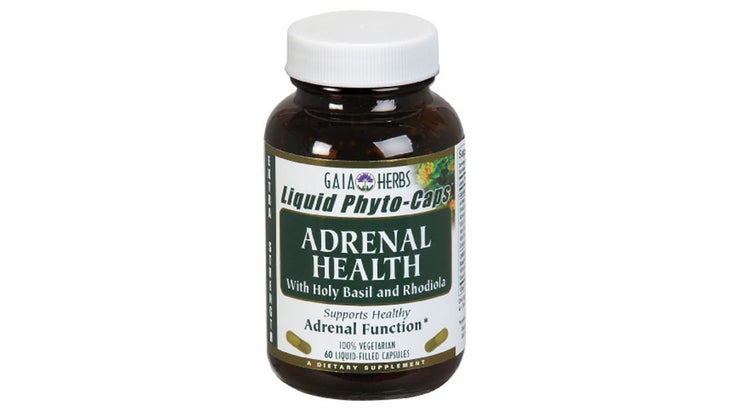
Gaia Herbs Adrenal Health provides nourishment to the adrenals, enabling the body to adapt to stress in a healthy way to help restore balance, harmony, and vitality.
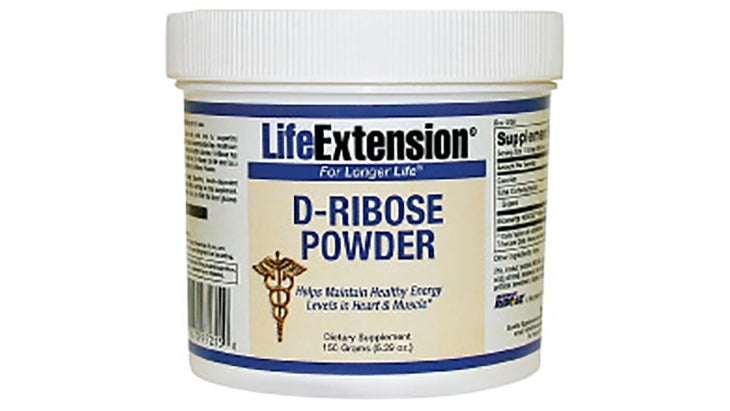
Life Extension D-Ribose Powder. Just one scoop daily supports energy levels in working muscles—a great boost before a workout. It has a mildly sweet taste and can be mixed into hot or cold drinks.
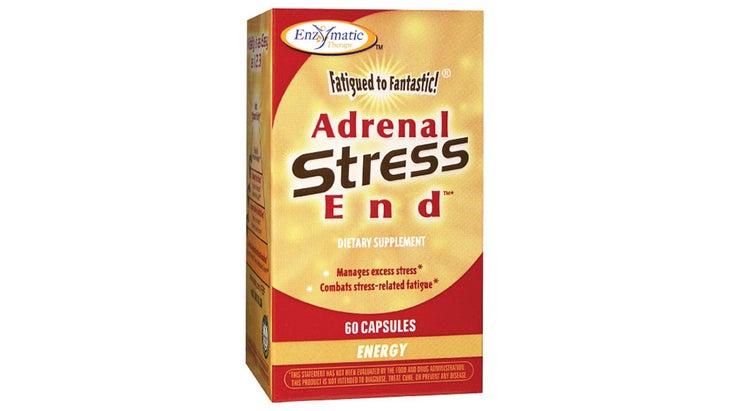
Enzymatic Therapy Fatigued to Fantastic! Adrenal Stress End supports adrenal gland function and healthy levels of cortisol (the stress hormone) with predigested adrenal extract for superior absorption.
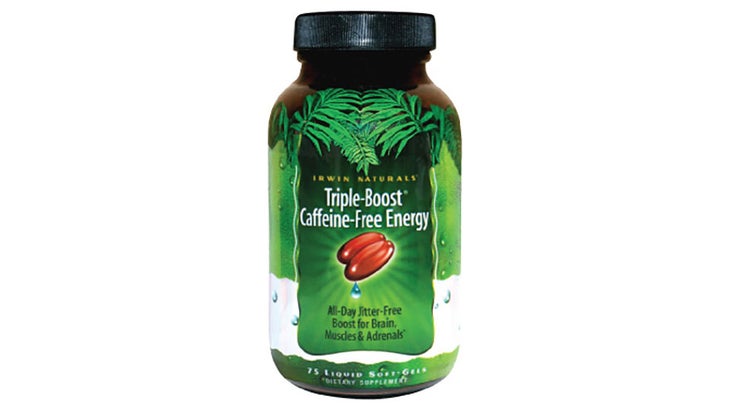
Irwin Naturals Triple Boost Caffeine-Free Energy is specially formulated with energizing herbs and B vitamins, for a boost without the “burn-out” that can occur from caffeinated products.
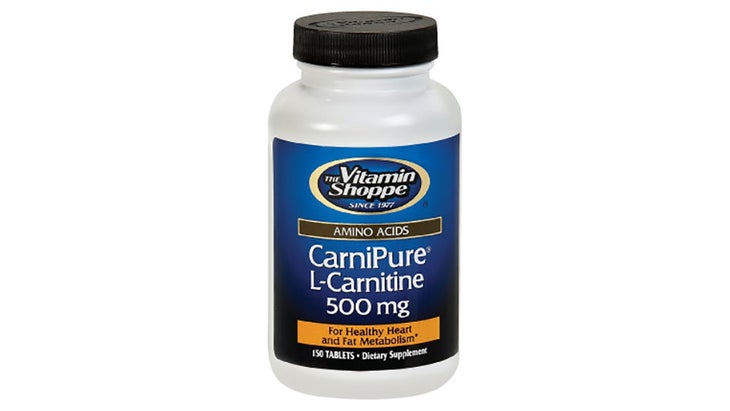
The Vitamin Shoppe Carnipure L-Carnitine aids the transport of fatty acids into cells so that they can be metabolized for energy. Tablets are free of yeast, wheat, corn, soy, and other allergens.